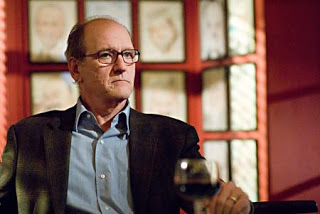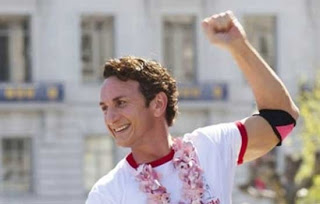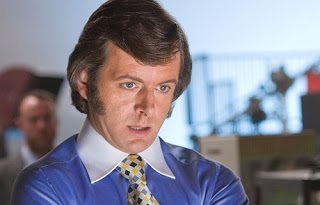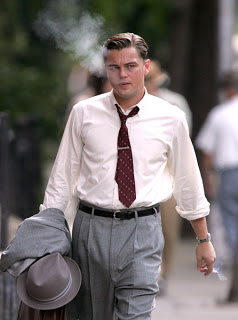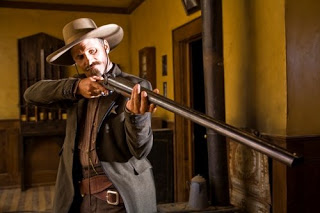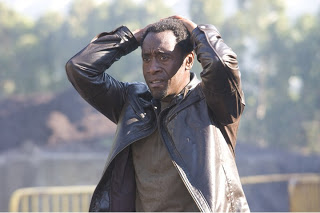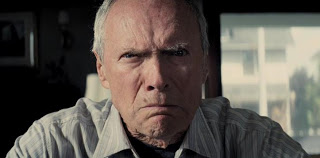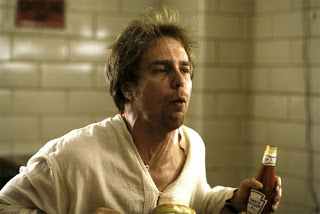NOMINEES
Richard Jenkins – The Visitor
Frank Langella – Frost/Nixon
Sean Penn – Milk
Brad Pitt – The Curious Case of Benjamin Button
Mickey Rourke – The Wrestler
WILL WIN
Of the eight major Oscar categories, I think the Best Actor race is the hardest to predict this year (perhaps along with Best Original Screenplay). That isn’t to say my prophecies in the remaining categories are foolproof; the Academy has shown time and again that there’s no such thing as a lock at the Oscars (guh, Brokeback Mountain), and last year’s show featured winners in big races that ranged from legitimately surprising (Marion Cotillard) to “That fucker came out of nowhere!” (Tilda Swinton). But there’s usually at least enough data floating around out there for me to feel comfortable with my selection. This category, not so much.
But fuck it, I need a challenge. The good news is that we can safely eliminate two categories right away. Richard Jenkins has been walking around with the “I’m just happy to be here!” face that he borrowed from the ’99 Knicks after they got demolished by the Spurs in the finals. Not that I blame him – the guy has been one of the most venerable character actors in cinema for the past decade, and he was about as visible to the moviegoing public as a pack of thestrals. An Oscar nomination should change that. Still, in terms of winning, he’s hopeless.
Also hopeless, oddly enough, is the biggest movie star of the bunch, Brad Pitt. Now, The Curious Case of Benjamin Button acquired the most nominations out of any film this year (13), and if it were primed for Return of the King-style dominance, I might be inclined to keep Pitt in the running. But while I expect Benjamin Button to take home its share of prizes in the technical categories, Slumdog Millionaire remains the clear frontrunner for the big prizes. As such, Pitt doesn’t have any coattails to ride, and his performance – while perfectly serviceable – isn’t of the caliber of his competitors.
So we’re left with three, and while Frank Langella is clearly on the outside looking in, he can’t be discounted completely. Any time a race is explicitly documented as a duel between two major candidates, there’s always a chance that the favorites will split the vote, allowing an outsider to sneak in for the victory (see: Adrien Brody, The Pianist, 2002). Since Langella clearly ranks ahead of both Pitt and Jenkins, it’s feasible that he could take the prize should the leaders chip away at each other’s armor too heavily.
Those leaders, of course, are Sean Penn for Milk and Mickey Rourke for The Wrestler, and this particular Best Actor race is shaping up to be one of the strangest Oscar duels ever, and one that is rife with subplots. First off, it’s practically a dead heat; usually one contender piles up more hardware on the minor circuits, but Penn and Rourke have each won more than a half-dozen awards. Penn’s top prizes came from the Screen Actors’ Guild and the Broadcast Film Critics, plus big wins in New York and L.A., while Rourke claimed victory at the BAFTAs and Golden Globes. Hell, the pair even tied for Best Actor – twice (in Boston and San Francisco). It’s simply impossible to tally up the previous wins and declare one of them the prohibitive favorite.
Even more bizarre has been the amicability of the whole thing. Granted, it’s not as if actors in contention for Oscars make a habit of ritually insulting their opponents, but you can usually sense some fierce competition beneath the veneer of civility (call me crazy, but I think there’s a reason Adrien Brody and Jack Nicholson have never worked together). But over the past month, the perception is that Penn and Rourke actually seem to be rooting for each other. They’re constantly thanking each other in their respective victory speeches, interviewing together, and generally palling around like Butch and Sundance.
(Frankly, it’s a bit weird, and I find the whole spirit of camaraderie vaguely un-American. If I’m ever competing for something against a friend of mine, you can be damn sure I’ll be desperate in my desire to win so I can rub it in his face for the next 10 years. In fact, that pretty much personifies my mindset every time I play ping-pong.)
Then there’s the context of each actor’s performance. Penn has always been an outspoken Hollywood liberal (he mumbled derisively about Bush and WMDs while accepting his Oscar for Mystic River five years ago), and his resonant portrayal as a famous gay politician from San Francisco has provided grist for controversy in a state that just passed Proposition 8. Rourke, meanwhile, plays a washed-up former superstar looking for redemption, a career path that eerily mirrors his own trajectory in Hollywood.
And then there are the disparate personalities of the actors themselves. Penn is the classic Oscar veteran – he’s a familiar face (Milk represents his fifth nomination), he knows how to play the game (he’s dampened the aggressiveness of his politicking lately), and he has developed cachet as one of the most consistently excellent actors operating today. You know what you’re going to get from Sean Penn, and so do the voters.
Rourke, in contrast, is a firebrand. The warm-blooded actor tends to curse during his speeches, there are whispers of steroid use in his past, and he hardly possesses the pedigree of a Best Actor winner (his prior movie to The Wrestler? Something called Stormbreaker. Even I hadn’t heard of it). It’s uncertain, however, how voters will respond to his distinctive persona. Will they shrink from his roguish iconoclasm or embrace his man-of-the-people authenticity?
These external factors and others will weigh heavily on voters’ minds when filling out their ballots, and I find that fact highly unfortunate. My problem is that, with all the pop-culture hoopla surrounding the duo’s nominations, no one seems to be focusing on the performances themselves. That’s a shame, because they’re both fine examples of talented artists dedicating themselves to their craft. I recognize that it’s only natural for public perception to infiltrate the voting process to a degree, but this particular Best Actor race, with its infinite storylines and groundswell of public awareness, seems to have distanced itself completely from the actual acting.
“Hasn’t Mickey earned it because of his amazing comeback? Will the gay community’s support help or hurt Sean’s chances? Isn’t it only fair for Mickey to win the Oscar, since Sean already has one? Shouldn’t we acknowledge Sean’s efforts in highlighting a revolutionary moment in American politics?” These seem to be the questions people are constantly asking, as opposed to the one that most interests me, namely: “Which performance do you think is best?”
Yet such is the way the game is played, I suppose. As such, in predicting a winner, I’m forced to look beyond the acting and at the actors. And in this case, I think the triumphant tale of Rourke’s redemption trumps the topical relevance of Penn’s homage. It’s a complete guess, of course, and I don’t pretend to have any insider information illuminating my pick. (Also, I’m still not counting out Frank Langella – if he wins, I will be surprise but not shocked.) But Rourke’s comeback has reached astonishing proportions in the public eye – at this point he’s like Lazarus crossed with Kurt Warner. Voters just won’t be able to resist picking him. Mickey Rourke takes home his first Oscar in a squeaker.
SHOULD WIN
I never thought I’d say this, but I’m less impressed with this year’s actors than I am with their counterparts in the Best Actress race. Perhaps that says more about the stellar quality of today’s leading ladies than it does about these five actors, but the fact remains that last year featured two performances that absolutely blew me away (George Clooney in Michael Clayton and Daniel Day-Lewis in There Will Be Blood, in that order). This year didn’t have any.
But still, these are all very good performances from very good actors. Brad Pitt again illustrates his remarkable humility in The Curious Case of Benjamin Button. You’d think such a naturally charismatic individual would have difficulty diminishing his star quality for the sake of the film, but Pitt is marvelously restrained as the title character in David Fincher’s epic. Benjamin, stuck in an existential predicament, is a contemplative soul, and Pitt plays him as a quietly watchful sort, reacting to the events around him rather than thrusting himself into the limelight. It isn’t a showy performance, but it’s the right one for the movie, and Pitt’s discipline helps infuse Benjamin with dignity, sadness, and longing.
Richard Jenkins’ work in The Visitor is also not showy, but it is ingrained with a deep sense of truth. The film tells the potentially preposterous story of a depressed middle-aged man named Walter who, after finding that two immigrants have taken up residence in his part-time apartment, strikes up a tentative friendship with one of them and eventually rediscovers his passion for life while learning to play the drums. It’s a somewhat absurd plot, and in another’s hands we almost certainly would have rejected it, but Jenkins – playing a bored economics professor who finds his students to be stale (my Dad’s reaction: “It was like looking in a mirror”) – makes Walter’s transformation gradual and therefore completely convincing. He intensifies the loneliness and monotony in Walter’s life, thus lending credibility to his abandonment of it and his embrace of the more free-wheeling lifestyle of the immigrants. It’s a perfectly modulated performance, and while The Visitor may be a minor film, it hopefully signals the arrival of a major talent to the Hollywood stage.
(Jenkins’ combination of restraint and versatility reminds me, oddly enough, of another stellar character actor who made the big-time after he found himself lost in New Zealand. Jenkins may lack Viggo Mortensen’s innate charisma, but he has the acting chops. We can expect to see him at the Oscars again.)
I don’t have a whole lot to say about Mickey Rourke’s performance in The Wrestler except to say that he’s completely convincing. Physically we have no difficulty buying him as a fearsome but aged beast of a man, and he features a full emotional registry, showcasing his character’s wounded pride and compassion as well as his anger and regret. His best scenes are those with Marisa Tomei, where he politely but aggressively pursues her character with the perfect combination of clumsiness and charm. His moments with Evan Rachel Wood are less convincing, but that’s more the fault of the film’s hyperbolic screenplay than with either of the actors. Given Rourke’s history, I don’t know that we can safely expect him to return with another performance of this caliber in the near future, but I can’t deny the quality of his work in this film.
I will admit, however, that I’m slightly confused regarding the hullabaloo over Rourke’s supposed resurrection as an actor. I’m not disputing his lackluster status during the ‘90s; any time your most memorable appearance in a decade was in a movie with Jean-Claude Van Damme and Dennis Rodman, it’s safe to say those were 10 rough years. But Rourke was already tracking back to success with two high-profile performances in 2005 – he was deliriously entertaining as an invincible vigilante in Sin City and similarly engaging as a rough-and-tumble bounty hunter in Tony Scott’s unappreciated (albeit flawed) Domino. Those are two high-profile movies – it’s not as if the guy was in a monastery or anything.
More to the point, the prevailing theme of Rourke’s Oscar campaign is that he’s a former superstar who fell from grace, and The Wrestler represents his return to peak form. So I have to ask: Was Mickey Rourke really that big a star in the first place? Maybe I’m oblivious because I wasn’t attuned to the Hollywood scene in the ‘80s, but from what I can gather Rourke’s best movies were Body Heat (1981) and Diner (1982). He was good in both, not to mention incredibly good-looking, but he was also a supporting player. My favorite performance of his is in Angel Heart, and no one’s ever heard of that movie. The Pope of Greenwich Village didn’t crack $10 million at the box office, Year of the Dragon earned middling reviews, and Nine 1/2 Weeks is only memorable because of the sex scenes. In related news, do you know how many combined Oscar and Golden Globe nominations Rourke had received in his career prior to The Wrestler? ZERO. It’s not like critics were hailing him as the next Paul Newman or anything.
So let’s cool it with labeling Rourke’s role in The Wrestler as this wildly improbable, “Cliff Lee winning the Cy Young after putting up a 6.29 ERA the year before” level comeback. John Travolta in Pulp Fiction – now that was a comeback. Mickey Rourke in The Wrestler was just a case of a talented but struggling actor finally finding the right role. I’m glad he did. Now let’s move on.
I wasn’t alive in the ‘70s, so I can’t tell you how accurate Frank Langella’s depiction of Tricky Dick is in Frost/Nixon, but I do know that he creates a thoroughly compelling and three-dimensional character. Consider a great throwaway scene early on in which Nixon discusses his impression of Frost with Jack Brennan, his confidant played with stout pride by Kevin Bacon. Nixon didn’t like Frost’s shoes because they didn’t have laces, so he asks Brennan for his opinion. “I think a man’s shoes should have laces, sir,” Brennan replies instantly. Nixon glances at him for a moment, then nods thoughtfully. “Quite right,” he says.
It’s a seemingly insignificant moment, but it sets up everything we need to know about Nixon as a character: his smug sense of superiority, his obsessive need to dominate his opponent in every measure, his thirst for approval from his followers. Langella doesn’t waste it – the look he shoots at Bacon is measured and calculating, as though Nixon is wondering if Brennan is simply telling him what he wants to hear. This also sets up the movie’s touching final scene in which, against all odds, we find we have developed a measure of sympathy for the president. I didn’t live through the Nixon years, but I heard enough about them from my parents to enter the theatre with a strong bias against him, but Langella’s portrayal of Nixon is so sincere (though not overly sympathetic) that he somehow turns a megalomaniac into a tragic hero.
(My only problem? I honestly don’t think Langella gave the best performance in the film. But we’ll get to that.)
My pick for Best Actor, however, is Sean Penn for Milk, for a performance of extraordinary compassion. Penn plays Harvey Milk not as a pure idealist but as a canny, assertive political animal. He recognizes he can radicalize the gay rights movement, and he isn’t above mounting a campaign that focuses on literally cleaning up dogshit in order to get elected and make a true difference.
Yet Harvey’s political ambition and skill is only part of the story of Milk. It’s also, of course, about the man himself, and the selfless manner in which he relates to others. Penn plays Harvey with a remarkable earnestness that is unbridled and real; an early scene in which he effortlessly seduces James Franco highlights his raw energy, both sexual and otherwise. But he also recognizes the hate that pervades America, and he determines to combat that hate, it seems, with pure kindness.
There’s a beautiful scene midway through the film when Harvey, preparing to thwart potential riots, receives a phone call from a teenage boy. He politely dismisses him, only then the boy tells him that he’s planning on killing himself. Penn’s face goes absolutely still before he replies, quietly, “You don’t want to do that … There’s nothing wrong with you”. It’s the same message Harvey is delivering to the entire country, but Penn’s voice is so focused, his expression so fixed, that we feel at that moment that he cares only for the welfare of the boy. There are politicians who say things in order to get elected, and then there are those who really care. Perhaps it’s fantasy, seeing a politician so desperately concerned with helping his own people, but in the hands of Sean Penn, it’s a heartwarming fantasy indeed.
DESERVING
Michael Sheen – Frost/Nixon. And here is my favorite performance in Frost/Nixon. Sheen was faced with a similar predicament in The Queen, when Helen Mirren won 74 different trophies and no one noticed his pitch-perfect performance as Tony Blair. This time around, Frank Langella is receiving deserved recognition, but I was more partial to Sheen’s portrayal of David Frost as a supremely charismatic, slightly hopeless TV personality. Sheen doesn’t utilize big moments in his acting – he prefers to convey feeling through hesitancy and timing. As we watch him quietly begin to drown in the pool he’s created for himself in Frost/Nixon, he doesn’t exaggerate his developing panic. He lets it build, growing gradually more squeamish and less confident with each scene, until one blissful moment of release – when he barks “It’s my birthday!” to a colleague – grants us an open window into his soul. We need to get him on an Oscar ballot soon before he gives up and focuses all his time on the Underworld franchise.
Leonardo DiCaprio – Revolutionary Road. As with his costar in this movie, at this point it’s almost boring how good he is. Every emotion he displays in this movie – whether he’s screaming at his wife or coolly putting the moves on a female subordinate – is utterly convincing. The guy is just on an unparalleled run right now; he’s been absolutely superb in his last six movies (in order: Catch Me If You Can, The Aviator, The Departed, Blood Diamond, Body of Lies, and this). Even the greatest actors occasionally make a movie where they dial it down from “totally incredible performance” to “really good performance”. Not DiCaprio, not right now. He’s been in the Totally Incredible Zone for six consecutive movies. And frankly, I don’t see it stopping with Shutter Island.
(If I had to come up with a sports corollary for him right now, I’d go with Stan Musial. Everyone obsesses over Williams and DiMaggio, and then we look at the numbers and realize Musial hit 475 home runs and had an OPS over .900 for 15 straight years, only no one ever seems to talk about him. Well, right now the Academy needs to watch some footage of Stan the Man, because someday we’re going to look back and wonder how the fuck DiCaprio didn’t get his first Oscar till he was almost 40.)
Viggo Mortensen – Appaloosa. More of the same from Viggo: completely disappears into his character, doesn’t take any shortcuts, makes no false moves. Just another performance of absolute integrity. At the beginning of this decade he was costarring in 28 Days with Sandra Bullock; now he’s the lead in the upcoming adaptation of Cormac McCarthy’s The Road. He’s arrived.
Don Cheadle – Traitor. It’s impressive that a Hollywood actor even signed up to play this part. How the fuck did they pitch this to him? “O.K., so here’s the deal: You play a religiously devout Muslim who sells bombs to fanatics, and the audience has to spend the entire first hour of the movie wondering if you’re a terrorist, and there isn’t any sort of narrative crux like a voiceover, so you have to convey your character’s inner conflict entirely with your eyes.” If I’m an agent, I’m telling my client to pass. Cheadle didn’t, and we’re fortunate for it.
Jason Segel – Forgetting Sarah Marshall. I could talk about how he brings legitimate emotional complexity to an archetypal role, or how he displays a veteran’s knack for sharp comic timing, or how he’s ballsy for having the nerve to show his junk. Or I could just watch him imitate Ian McKellen as Gandalf screaming “YOU SHALL NOT PASS!” over and over again.
Ben Kingsley – Elegy. Sir Ben stretched himself quite a bit this year, playing a weed-addicted American shrink in The Wackness and a corrupt Russian detective in Transsiberian. (He also took a part in The Love Guru – apparently his 401(k) got hit harder than most.) Still, he’s most effective in his element here, as an intellectual British professor who systematically seduces a young student (Penélope Cruz – where did these acting chops come from?) only to find himself emotionally detached from the whole enterprise. It’s a calculated, intelligent performance, one full of self-loathing but refreshingly free of vanity.
Clint Eastwood – Gran Torino. Talk about a man in his element. You could argue that Eastwood isn’t even acting here, but then you’d be arguing that he’s actually a terminally ill gun-toting racist, and I’d have to take issue with that. Gran Torino deals with weighty, obvious themes, but Eastwood brings a fine level of texture to its otherwise basic redemption story. He sells the character completely, and in doing so he sells the movie.
Chiwetel Ejiofor – Redbelt. No, you don’t know who he is because you can’t pronounce his name, but I promise you that you’ve seen him before (Dirty Pretty Things, Love Actually, Serenity, Children of Men, American Gangster). If he changed his name to Chase Eastman, he’d probably have signed a superhero deal by now. Regardless, Ejiofor is phenomenal in David Mamet’s curious ode to mixed martial arts. It’s difficult enough to master the staccato patter of Mamet’s dialogue, but Ejiofor does that and also imbues his character with a deep sense of honor and dignity. There is no questioning this man’s moral code, nor this actor’s talent.
Sam Rockwell – Choke. Sam Rockwell doesn’t need a name-change; as far as names go, “Sam Rockwell” is pretty sweet. He just needs a better press agent. Anyone who can bring a sliver of humanity to a sex addict who forces himself into choking fits at diners so he can be rescued and hopefully receive money from his benefactor should have at least received a Golden Globe nomination by now.
Robert Downey Jr. – Iron Man. Here’s my question. When he says “I am Iron Man” at the end of the movie, was there any doubt in your mind about the truth of that statement, or were you just nodding? I was nodding.
Jeremy Beck is the editor-in-chief of MovieManifesto. He watches more movies and television than he probably should.



